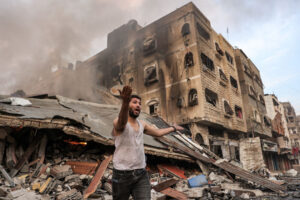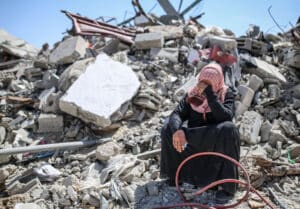When I was a boy, growing up in Gaza, we used to play a game called “Arabs and Jews”. Two children would be designated captains and pick their teams, then we would find some sticks, pretend they were guns, and spend hours happily pretending to shoot each other. When one of the Arab team was “killed”, his comrades would hoist him onto their shoulders and utter a chant in Arabic. “With our soul and our blood,” we cried, “we redeem you, martyr.”
I still live in Gaza, and I still see children playing after more than a year of war, usually in the large open areas that have been flattened by Israeli airstrikes, among the ruins of destroyed buildings.
But their game has been updated. Now, the children of Gaza call it “Hamas fighters and Jews” — and they’ve added other new elements too. They pretend they’re being chased by Israeli drones, whispering to each other, “there’s a drone coming! We must hide!” Sometimes, they pretend to blow up Israeli tanks with mines and IEDs. They play for hours, because they have no other entertainment, and nowhere else to go. But the chant when a fighter “dies” is the same as it always was, though there are far more real martyrs now than when I was a kid. Many of them are children too.
Thousands of children under the age of 18 have been killed since Hamas attacked Israel last year. Many more have been injured and maimed and thousands are thought to be uncounted.
Every aspect of the lives of those who have survived has been upended. The schools and kindergartens have been closed since October 7, and untold thousands have lost their homes.
Palestinian society has always been characterised by close family relationships, and young children find it very hard to accept that a brother or sister is dead. I hear them all the time. Adults will tell them they’re in paradise, but they don’t really know what that means. “He went shopping, but soon he will come back,” they say instead. “She went for a picnic and had to stay away a few nights, but I’m sure she’ll be home quite soon.”
I spoke to the mother of Abdeltaffah Montasir, who lost his father at the age of four. “He was no fighter,” she told me. “But like so many of us, he was killed. All the time the boy is asking about his father, demanding to know when he will return. He says he thinks he will be back when the war ends, and then asks me when that will be. How can I answer that? I have to deal with his grief, and I am grieving too.”
Some children try to compensate for the lack of anything resembling a normal, routine life. They badger their parents for school bags and uniforms, so that when the war ends, they’ll be ready to go back to class, and they want to be like other children when they do. It’s as if they think that by asking for something that will only have meaning when the war finally ends, they will bring that day closer.
“The children of the Gaza Strip naturally suffer from the effects of the trauma they have experienced, such as fear, introversion and loss,” explains Ola Kamal, a local child psychologist. “They relive violent events in their thoughts and in their play. Many suffer from nightmares and insomnia.
They suffer from an absence of positive emotions. Some act out their trauma with hyperactive excitement and tantrums, others display severe and persistent fear and sadness. Sometimes they deny what happened to them or their family, or try to avoid the places or people associated with a violent event.
“This war,” Ola says, “is creating a deeply troubled and hopeless generation.”
Palestinians have always placed a high value on education, and we are proud of our low illiteracy rate. Bothina Abdel Fattah, a mother of six aged 42, who lives in Deir Al Balah, tells me she fears that having gone without schooling for over a year, her kids have already forgotten much of what they knew. “Their level of achievement and knowledge have gone down significantly,” she says. “Yet most of the schools are not just closed, their buildings have been badly damaged or totally destroyed. When will they be able to start learning again? The longer this goes on, the more they will forget.”
“Because of the war, everything we valued has collapsed,” says Iyad Abdul Hakeem, for many years a teacher. “Instead of going to school, our students are in the streets or standing in lines for water, bread and other kinds of food. If the war were to stop tomorrow, it would take an enormous effort to make up for what has been lost.”
The schools may be closed, but there are voluntary initiatives trying to fill the gap. One is based in a small park in Al Bourej, where displaced people who lost their homes now live in tents.
Run by a teacher, Sabreen Fetiha, it provides basic tuition under canvas or in the open air in literacy and maths for over 200 children who would normally be in the first four grades of primary school. “We are trying to reconnect students to the educational process and compensate for part of their educational loss,” Fetiha explains, “and we hope this will prepare them to return to ordinary, full-time education when the war finally stops.”
Fetiha has managed to recruit three colleagues, who each have different specialist subjects, while stationery and other equipment has been donated by residents of the Bourej camp.
But welcome as the voluntary school is, it can feel dangerous to gather in the park. People are afraid that it could become a target.
And still the war grinds on. There was hope for months it would finish on the anniversary of October 7, and then, for a short time, after Yahya Sinwar was killed. But things keep changing. People were astonished that Sinwar died the way he did. They thought he was spending all his time in the tunnels, yet there he was, fighting on the frontline. Now he is widely seen as a hero, as a symbol of resistance, and even intellectuals who never supported Hamas are comparing him to Che Guevara, saying he’ll be seen as a symbol of revolution and resistance for years to come — for Palestinians and others too.
So Sinwar’s death has made Hamas more determined, not less. They’ll fight on to the end, and like Sinwar they don’t care if they die, because they believe that then they’ll begin their new, pleasant, trouble-free life in paradise.
And so, with neither side letting up, the war will last for many more months unless the international community somehow finds a way to stop it. The children playing fighters and Jews have told me they don’t ever want to become fighters for real, but if the war does not end, my fear is that they will.
Disclaimer
Some of the posts we share are controversial and we do not necessarily agree with them in the whole extend. Sometimes we agree with the content or part of it but we do not agree with the narration or language. Nevertheless we find them somehow interesting, valuable and/or informative or we share them, because we strongly believe in freedom of speech, free press and journalism. We strongly encourage you to have a critical approach to all the content, do your own research and analysis to build your own opinion.
We would be glad to have your feedback.
Source: UnHerd Read the original article here: https://unherd.com/



